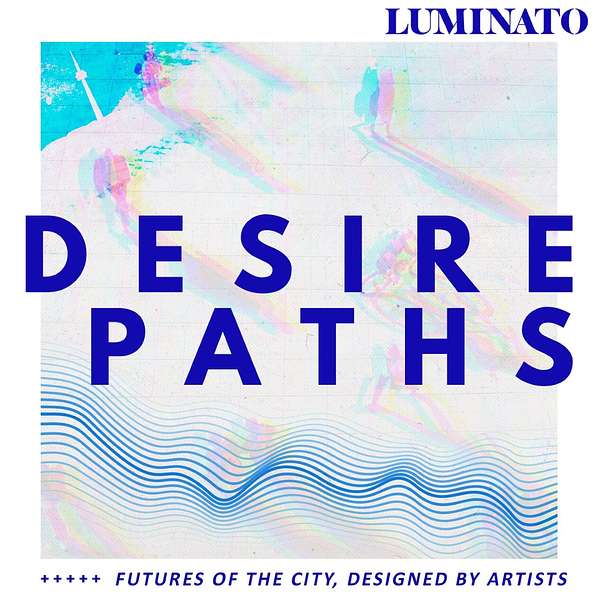
Desire Paths
Desire Paths are unpaved passages, slowly carved into the terrain of a city, formed by the citizens' own walking tracks, and guided by their belief in a better way.
Desire Paths is a six-part series of audio experiences that explore Toronto futures, designed by artists. Through field trips, self-guided narration, and interviews, each episode will offer a unique view into the artist’s imagination, inviting the listener to reflect on desired paths to shape the next decade in Toronto.
Field trips across the city provide the backdrop for reflection through movement and physical presence, allowing artists to connect their personal histories and lived experiences to their vision for possible futures. With premonitions in mind, the second part of each episode will delve into a conversation between the artist and a city-builder to explore how to bring this desired path into being.
Desire Paths is part of Luminato’s Illuminating Ideas program; a series of conversations and experiences that creatively explore some of the most important issues and ideas facing our world today.
Desire Paths is produced by Alex Rand, and co-curated by Hima Batavia and Alex Rand, with Creative Producers Macy Siu, Jeremy Glenn, and Robert Bolton of Toronto-based foresight studio, From Later.
Desire Paths
Aljumaine Gayle & Car Martin: Quayside Futures
Part 1
“The Traust Governance Group does not prioritize corporate greed or support the state agenda to surveil and track individuals. We believe that trust is significantly more important than surveillance.”
Welcome to QPL Arcology, an audio worlding experience created by Aljumaine Gayle and Car Martin. A mash-up of architecture and ecology, arcologies exist in the worlds of speculative fiction. In this particular speculative narrative, a tree at the base of Parliament Street takes you on a journey into a possible future for the Portlands. Recently conceived as the home for a new model “smart city”, QPL Arcology imagines the neighborhood rooted in data justice, interspecies collaboration, and trust-based governance.
Aljumaine Gayle is a queer interdisciplinary creative technologist working at the intersections of technology, art, design, and data justice. They are currently enrolled in OCADU’s Digital Futures program and actively co-organizes/ co-designs programming on behalf of IntersectTO. Aljumaine is also a researcher with the University of Toronto’s Technoscience Research Unit. Their art and research practice explores othering of Blackness in contemporary life, and aims to subvert this othering through Afrofuturism and the artistic use of technology. Their practice challenges the tokenism and trauma narratives that characterize the majority of mainstream Black art, film and music. @Aljumaine
Car Martin is an architect, artist, and facilitator who has recently launched Cyan Station, an architecture studio that focuses on using technology and user-centered principles towards a vision of collectivism, care, and environmental justice. Car is a professor at the George Brown School of Design, where they teach interaction and experience design (UI/UX) at the Waterfront campus, a stone’s throw from the proposed Quayside development. In 2020, Car led a series of student projects exploring smart city technologies from a critical perspective, including prototypes for anti-surveillance fashion and design interventions. Car also recently contributed to a book on the same topic, “Smart Cities in Canada: Digital Dreams, Corporate Designs”, based on research about marginalized communities fighting surveillance in beautiful and creative ways.
Part 2
In the second half of the episode, Aljumaine and Car unpack their speculative utopia and its neighbourhoods. Ideas around power, collective care, and the need for speculative and critical design rise to the surface. How can we learn from natural intelligence and make better technological tools for collaboration and cooperation? How can data be decentralized, transparent, and transmuted into public art? And how can we educate citizens on how their data is used, to return power to the people, and better inform our communities?